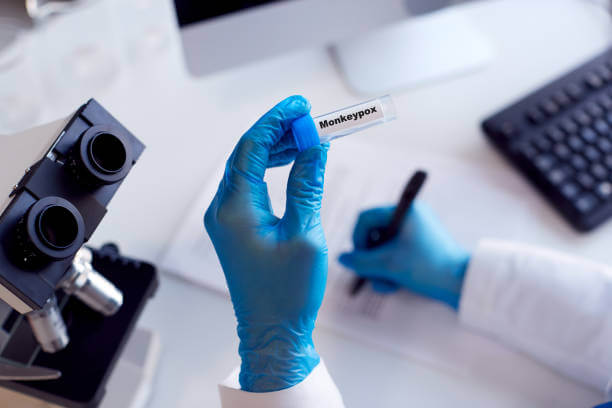The Biden Administration declared monkeypox a public health emergency on Thursday, August 4, weeks after the World Health Organization (WHO) named the virus as an international public health emergency.
According to the WHO, a public health emergency generally lasts for 90 days, although it can be extended if deemed necessary. This declaration allots additional funding and resources for government use to more effectively combat the emergency at hand. In the case of monkeypox, agencies like the Department of Health and Human Services now have access to additional funds and the Food and Drug Administration can make treatments like vaccines more easily available.
Additionally, the public health emergency declaration serves as a warning signal to the general public. Given the nature of the virus, health officials have cited college campuses as an especially high risk area for transmission of the infectious disease.
Several universities across the U.S. have already confirmed cases among students before the start of the fall semester, including Georgetown University, George Washington University, the University of Texas at Austin, Bucknell University, and West Chester University.
On August 29, Monmouth University sent an email to all students with information about monkeypox including transmission, symptoms, prevention, and what to do in the event of exposure.
“Monkeypox is an infectious disease caused by a pox-virus usually not commonly seen in the United States. However, monkeypox cases have recently been increasing in the United States with a rapid rise in cases in New Jersey and the New York metropolitan area,” wrote Kathy Maloney DPN, APN, Director of Health Services at Monmouth University. “College students, sexually active adults, those living in congregate settings and participants in social networks with intimate physical body contact make these populations of concern.”
“College kids have sex. You’re living in close living conditions and sometimes dorms might not be the cleanest places on the planet,” explained Patricia Dempsey DNP, APN-BC, PPCNP-BC, Specialist Professor of Nursing and Interim Director of MSN Program.
“Students are social creatures who are out and about, which makes them susceptible to monkeypox,” added Mary Anne Nagy, Vice President for Student Life and Leadership Engagement. “The best thing we can do is bring it to your attention and provide education and information about it and have a protocol in place if you start having symptoms. The email we sent was more informational and educational, and we wanted to establish some preventative measures. Knowledge is power.”
According to the Center for Disease Control and Prevention (CDC), monkeypox can spread through “direct contact with monkeypox rash, scabs, or body fluids from a person with monkeypox, touching objects, fabrics, and surfaces that have been used by someone with monkeypox, and contact with respiratory secretions.”
Maloney noted that monkeypox is not nearly as transmissible as COVID-19, explaining that “COVID-19, especially Omicron, is highly transmissible and air borne. It can be spread simply by talking and being in close proximity to a positive case. In contrast, monkeypox is primarily being spread through intimate, skin-to-skin contact.”
“COVID-19 isn’t gone. It’s still a problem. We still have about seven or so cases on campus,” explained Nagy. “I’m not worried that monkeypox is going to be as big of a problem as COVID, and I don’t see it as something that will change the modality of how classes are delivered. It’s still something that we have to be aware of and communicate information to our students so they are aware and are conscious of it.”
“There are no current indicators to suggest a pandemic-size event with monkeypox,” added Maloney. “It is containable through community education, recognition of signs and symptoms and treatment. Worldwide, the number of cases are decreasing, but that hasn’t occurred yet in the United States. However, New York City was able to decrease cases by 78 percent through education, behavior modification and vaccination outreach to at-risk populations.”
Despite the apparent differences between the COVID-19 pandemic and the recent monkeypox outbreaks, the recommended course of action for prevention remains the same: get vaccinated.
“At the present time, vaccine supply in New Jersey is limited and being distributed only to direct contacts,” said Maloney. “If a student becomes a direct contact, call Health Services immediately. We have contacts within the Visiting Nurses Association of Central Jersey and the Monmouth County Health Department to gain access to the limited supply of vaccines.”
The monkeypox vaccine is distributed in two doses, given four weeks apart. It is recommended that you get the vaccine within four days of exposure. Still, students must remain cautious of the virus and be aware of its symptoms in order to prevent outbreaks on campus.
“As a community, I think it’s important that we are vigilant and do our best to prevent campus-wide outbreaks like we saw with the COVID-19 pandemic,” said Julian Rebelo, a senior Chemistry student.
“Containment is the goal. Identifying symptoms, quarantining, going home, and notifying close contacts is the plan,” said Dempsey. “We can only hope that anyone with symptoms reports to Health Services.”
“Prevention starts at the individual level,” Maloney added. “Students can protect themselves by first becoming educated on the signs and symptoms of monkeypox. Limiting the number of sexual partners will greatly reduce risk, especially if having sexual encounters within a high-risk population. Currently monkeypox has disproportionately affected men who have sex with men, but it can affect anyone.”




